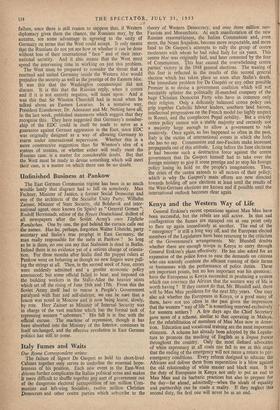• Italy Fumes and Waits
Our Rome Correspondent writes: The failure of Signor De Gasperi to hold his short-lived Cabinet together only serves to underline the essential hope- lessness of his position. Each new event in the East-West detente further complicates the Italian political scene and makes it more difficult to shuffle together any sort of government out of the dangerous electoral juxtaposition of ten million Com- munists and left-wing Socialists, twelve million Christian Democrats and other centre parties which subscribe to the theory of Western Democracy, and over three million neo- Fascists and Monarchists. At each manifestation of the new Russian reasonableness, the Italian Communists and, even more, the Nenni Socialists, become more respectable, and more fatal to De Gasperi's attempts to rally the group of centre moderates with whom he had ruled Italy for six years. This centre bloc was originally laid, and later cemented by the fear of Communism. This fear caused the overwhelming centre parties' victory in the 1948 general elections. The waning of this fear is reflected in the results of this second general election which has taken place so soon after Stalin's death. The immediate problem for De Gaspdri or any other possible Premier is to devise a government coalition which will not inevitably splinter the politically ill-matched company of the huge Christian Democrat Party who have in common only their religion. Only a delicately balanced centre policy can grip together Catholic labour leaders, southern land barons, intellectual progressives on the French model (so highly suspect in Rome), and the complacent Papal nobility. But a strictly centre policy cannot win a stable majority and certainly not a majority large enough to allow a government to rule positively. Once again, as has happened so often in the past, Italy is the victim of international events in which she feels she has no say. Communists and neo-Fascists make incessant propaganda out of this attitude. Long before the June elections it had become such a destructive force against the centre government that De Gaspen himself had to take over the foreign ministry to give it some prestige and to stop his foreign policy losing its hold on the people's imaginations. Thus, the crisis of the centre extends to all sectors of their policy; which is why De Gaspen's pain efforts are now directed towards holding off new elections at least until the results of the West-German elections are known and if possible until the international outlook becomes clear again.


































 Previous page
Previous page